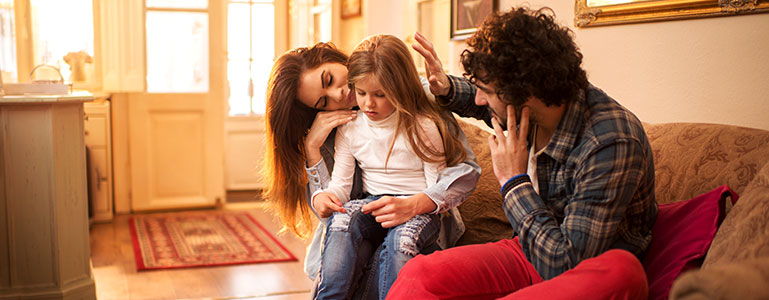Helping Kids Adjust during Separation and Divorce
Time and again, research suggests that parental conflict is a strong predictor of how children will do following parental separation and divorce. Parents’ ability to cooperatively co-parent without exposing their children to ongoing conflict can provide a critical foundation for healthy adjustment. Conversely, parents who remain hostile toward one another and continue to openly battle are likely to pave the way for their children’s maladjustment.
This makes sense, right? It’s a big transition to have two homes and less time with both parents. Children who must also face ongoing fighting and conflict between their parents while they endure all of the changes prompted by a separation or divorce would probably struggle more and have more anxiety and depression than children who go through a separation or divorce but do so within a low conflict, cooperative parenting arrangement. So you may say, “Fine. I get it. But how on earth am I supposed to peacefully parent with my kids’ other parent when the very reasons that we got divorced still cut so deep. Staying focused can help.
Below, are some possible ways to stay focused and improve outcomes for your children as they adjust to the changes in their lives. I know that there are situations where some of these suggestions are simply not feasible. They are, by no means, “have to’s” but rather options for you to consider.
- Seek support for yourself. Your relationship with your children’s other parent has now shifted. Whether you turn to therapy, family, friends, a spiritual community, a combination of these, or something entirely different that helps you finds your way, it is critical that you reach out and allow yourself to be supported during this time of tremendous adjustment. Feeling supported will assist you in effectively parenting and in turn help your kids.
- Look for signs of distress in your children. If you are thinking that your child is doing just fine in the midst of this adjustment, but you begin to notice some differences in behavior– emotion, somatic complaints that can signify stress or other changes–it might be time to reexamine the level of tension and conflict. Please know that most children will be distressed as they go through this process. They’ll have ups and downs, but their overall distress should ease up over time. If it doesn’t ease up, your child may need further support. Meeting with a skilled therapist, a support group with other children, or attending programs that specifically help kids adjust to these new changes can be very helpful.
- Meeting with a parenting coach can be helpful. Oftentimes, it can be extremely helpful to have a neutral third party assist in ironing out differences in opinion and be a sounding board that keeps you focused on your children rather than each other. Remember that the experts at Parents Place can always help you. Whether it’s how to first tell your children about the separation or it’s support with co-parenting into the future, we are here for you and your children.
- Maintain good boundaries when it comes to your relationship with your children and their other parent. While it is critical to come to an agreement on the big stuff, like school and health, you don’t need to agree on all of the little stuff. Each of you will need room to parent as you see fit without meddling with each other about the small things.
- Demonstrate respect toward your children’s other parent. That means using respectful language about and toward him/her, especially if your children are anywhere within earshot. Remember, your children’s other parent is an important part of their identity. Respecting him/her is a way of respecting your children. Make sure that you do not place them in a loyalty conflict, feeling the need to choose between you and their other parent.
The adjustment for both parents and children when separation and divorce happens is challenging. We are here at Parents Place to support you. Make sure to reach out for support. Contact us today for a consultation!
You can also check out our popular workshops on handling separation and divorce, including Kids’ Turn.
Kathleen O’Conner, MSW is a Clinical Social Worker at Parents Place in San Francisco. Contact us to schedule a consultation with Kathleen.

